M is for Merrow.

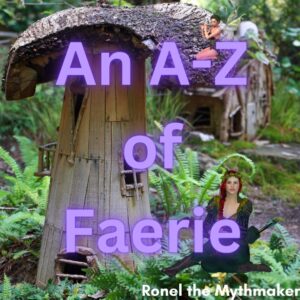
Mermaids in various forms can be found across the globe.
Mermaid definition (by Ronel)
A familiar figure in folklore from around the world, this half-woman, half-fish creature is usually depicted as being a beautiful woman from the waist up and a glistening fish from the waist down. For the most part, the mermaid sits on a rock and combs her lustrous hair without a care in the world. “Mere” comes from Old English meaning “sea” or “lake” (large body of water) and “maid” means “young woman”, thus mermaid is a young woman of the water.
Each culture has its own version of the mermaid and thus the appearance (and name) varies from region to region.
Sometimes the mermaid is portrayed as a vicious, lustful temptress using her charms to lure men to their watery deaths. Other times she is a gentle, wish-granting creature that also warns about storms and imminent danger. Depending on the culture and tale, different aspects of the mermaid’s character are emphasised. But stereotypes shouldn’t be believed: the mermaid, by whatever name, is a capricious faery with an agenda all her own.
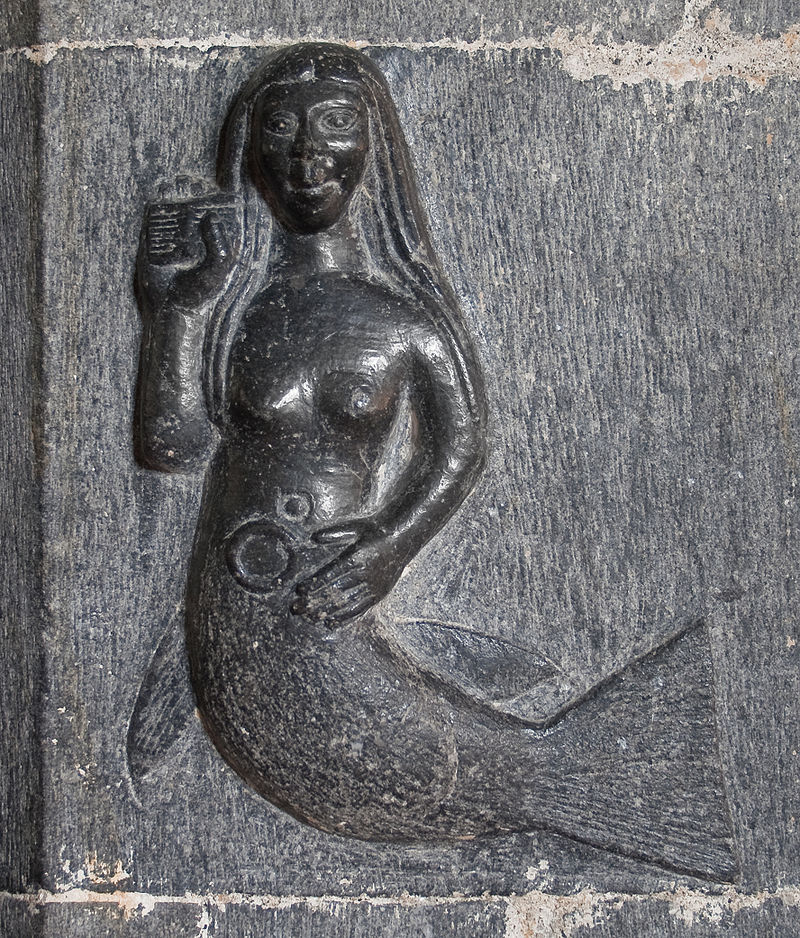
15th-century carving of a mermaid with comb and mirror, Clonfert Cathedral, Ireland. Image credit.
Though Merrows might look like mermaids from myth, they certainly don’t grant wishes.
Folklore
Writings on Irish Folklore, Legend and Myth by W.B. Yeats
The Merrow, or if you write it in the Irish, Moruadh or Murrúghach, from muir, sea and oigh, a maid, is not uncommon, they say, on the wilder coasts. The fishermen do not like to see them, for it always means coming gales. The male Merrows (if you can use such a phrase – I have never heard the masculine of Merrow) have green teeth, green hair, pig’s eyes, and red noses; but their women are beautiful, for all their fish tails and the little duck-like scale between their fingers. Sometimes they prefer, small blame to them, good-looking fishermen to their sea lovers. Near Bantry, in the last century, there is said to have been a woman covered all over with scales like a fish, who was descended from such a marriage.
Sometimes they come out of the sea, and wander about the shore in the shape of little hornless cows. They have, when in their own shape, a red cap, called a cohullen druith, usually covered with feathers. If this is stolen, they cannot again go down under the waves.
Red is the colour of magic in every country, and has been so from the very earliest times. The caps of fairies and magicians are well-nigh always red.
Fairy Legends and Traditions by Thomas Crofton [1825]
There are several folktales featuring Merrows, but this one seems to tick all the boxes of what a Merrow is.
The Lady of Gollerus
ON the shore of Smerwick harbour, one fine summer’s morning, just at day-break, stood Dick Fitzgerald “shoghing the dudeen,” which may be translated, smoking his pipe. The sun was gradually rising behind the lofty Brandon, the dark sea was getting green in the light, and the mists clearing away out of the valleys went rolling and curling like the smoke from the corner of Dick’s mouth.
” ‘Tis just the pattern of a pretty morning,’. said Dick, taking the pipe from between his lips, and looking towards the distant ocean, which lay as still and tranquil as a tomb of polished marble. “Well, to be sure, continued he, after a pause, ” ’tis mighty lonesome to be talking to one’s self by way of company, and not to have another soul to answer one – nothing but the child of one’s own voice, the echo ! I know this, that if I had the luck, or may be the misfortune,” said Dick with a melancholy smile, “to have the woman, it would not be this way with me – and what in the wide world is a man without a wife? He’s no more surely than a bottle without a drop of drink in it, or dancing without music, or the left leg of a scissars, or a fishing line without a hook, or any other matter that is no ways complete. – Is it not so?” said Dick Fitzgerald, casting his eyes towards a rock upon the strand, which, though it could not speak, stood up as firm and looked as bold as ever Kerry witness did.
But what was his astonishment at beholding, just at the foot of that rock, a beautiful young creature combing her hair, which was of a sea-green colour; and now the salt water shining on it, appeared, in the morning light, like melted butter upon cabbage.
Dick guessed at once that she was a Merrow, although he had never seen one before, for he spied the cohuleen driuth, or little enchanted cap, which the sea people use for diving down into the ocean, lying upon the strand, near her; and he had heard; that if once he could possess himself of the cap, she would lose the power of’ going away into the water so he seized it with all speed; and she, hearing the noise, turned her head about as natural as any Christian.
When the Merrow saw that her little diving-cap was gone, the salt tears – doubly salt, no doubt, from her – came trickling down her cheeks, and she began a low mournful cry with just the tender voice of a new-born infant. Dick, although he knew well enough what she was crying for, determined to keep the cohuleen driuth, let her cry never so much, to see what luck would come out of it. Yet he could not help pitying her and when the dumb thing looked up in his face, and her cheeks all moist with tears, ‘t was enough to make any one feel, let alone Dick, who had ever and always, like most of his countrymen, a mighty tender heart of his own.
” ‘Don’t cry, my darling,” said Dick Fitzgerald; but the Merrow, like any bold child, only cried the more for that.
Dick sat himself down by her side, and took hold of her band, by way of comforting her. ‘Twas in no particular an ugly hand, only there was a small web between the fingers, as there is in a duck’s foot; but ’twas as thin and as white as the skin between egg and shell.
” What’s your name, my darling?” says Dick, thinking to make her conversant with him; but he got no answer; and he was certain sure now, either that she could not speak, or did not understand him : he therefore squeezed her hand in his, as the only way he had of talking to her. It’s the universal language; and there’s not a woman in the world, be she fish or lady, that does not understand it.
The Merrow did not seem much displeased at this mode of conversation; and, making an end of her whining all at once ” Man,” says she, looking up in Dick Fitzgerald’s face, ” Man, will you eat me?”
“By all the red petticoats and check aprons between Dingle and Tralee,” cried Dick jumping up in amazement, “I’d as soon eat myself, my jewel! Is it I eat you, my pet? -Now, ‘t was some ugly ill-looking thief of a fish put that notion into your own pretty head, with the nice green hair down upon it, that is so cleanly combed out this morning! “
“Man,” said the Merrow, ” what will you do with me, if you won’t eat me?”
Dick’s thoughts were running on a wife : he saw, at the first glimpse, that she was handsome; but since she spoke, and spoke too like any real woman, he was fairly in love with her. ‘Twas the neat way she called him man, that settled the matter entirely.
“Fish,” says Dick, trying to speak to her after her own short fashion; ” fish,” says he, ” here’s my word, fresh and fasting, for you this blessed morning, that I’ll make you mistress Fitzgerald before all the world, and that’s what I ‘ll do.”
“Never say the word twice.” says she; ” I’m ready and willing to be yours, mister Fitzgerald; but stop, if you please, ’till I twist up my hair.”
It was some time before she had settled it entirely to her liking for she guessed, I suppose, that she was going among strangers, where she would be looked at. When that was done, the Merrow put the comb in her pocket, and then bent down her head and whispered some words to the water that was close to the foot of the rock.
Dick saw the murmur of the words upon the top of the sea, going out towards the wide ocean, just like a breath of wind rippling along, and, says he, in the greatest wonder, “Is it speaking you are, my darling, to the salt water?”
“It’s nothing else,” says she, quite carelessly, ” I ‘m just sending word home to my father, not to be waiting breakfast for me ; just to keep him from being uneasy in his mind.”
” And who’s your father, my duck?” says Dick.
” What!” said the Merrow, ” did you never hear of my father? he’s the king of the waves, to be sure!”
“And yourself, then, is a real king’s daughter ?” said Dick, opening his two eyes to take a full and true survey of his wife that was to be.
“Oh, I’m nothing else but a made man with you, and a king your father; to be sure he has all the money that’s down in the bottom of the sea ! “
“Money,” repeated the Merrow, ” what’s money?”
” ‘Tis no bad thing to have when one wants it,” replied Dick; “and may be now the fishes have the understanding to bring up whatever you bid them?”
“Oh ! yes,” said the Merrow, “they bring me what I want.”
“To speak the truth,” said Dick, ” ’tis a straw bed I have at home before you, and that, I’m thinking, is no ways fitting for a king’s daughter: so if ‘t would not be displeasing to you, just to mention, a nice feather bed, with a pair of new blankets – but what am I talking about? may be you have not such things as beds down under the water?”
“By all means,” said she, ” Mr. Fitzgerald – plenty of beds at your service. I’ve fourteen oyster beds of my own, not to mention one just planting for the rearing of young ones.”
“You have,” says Dick, scratching his head and looking a little puzzled. ” ‘T is a feather bed I was speaking of but clearly, yours is the very cut of a decent plan, to have bed and supper so handy to each other, that a person when they’d have the one, need never ask for the other.”
However, bed or no bed, money or no money, Dick Fitzgerald determined to marry the Merrow, and the Merrow had given her consent. Away they went, therefore, across the strand, from Gollerus to Ballinrunnig, where Father Fitzgibbon happened to be that morning.
“There are two words to this bargain, Dick Fitzgerald,” said his Reverence, looking mighty glum. “And is it a fishy woman you’d marry? – the Lord preserve us ! – Send the scaly creature home to her own people, that’s my advice to you, wherever she came from.”
Dick had the cohuleen driuth in his hand, and was about to give it back to the Merrow, who looked covetously at it, but he thought for a moment, and then, says he –
“Please your Reverence, she’s a king’s daughter.”
“If she was the daughter of fifty kings,” said Father Fitzgibbon, ” I tell you, you can’t marry her, she being a fish.”
“Please your Reverence,” said Dick again, in an under tone, ” she is as mild and as beautiful as the moon.”
“If she was as mild and as beautiful as the sun, moon, and stars, all put together, I tell you, Dick Fitzgerald,” said the Priest, stamping his right foot, “you can ‘t marry her, she being a fish !
“But she has all the gold that’s down in the sea only for the asking, and I’m a made man if I marry her; and,” said Dick, looking up slyly, ” I can make it worth any one’s while to do the job.”
“Oh ! – that alters the case entirely,” replied the Priest; “why there’s some reason now in what you say: why didn’t you tell me this before ? – marry her by all means if she was ten times a fish. Money, you know, is not to be refused in these bad times, and I may as well have the hansel of it as another, that may be would not take half the pains in counselling you as I have done.”
So Father Fitzgibbon married Dick Fitzgerald to the Merrow, and like any loving couple, they returned to Gollerus well pleased with each other. Every thing prospered with Dick – he was at the sunny side of the world; the Merrow made the best of wives, and they lived together in the greatest contentment.
It was wonderful to see, considering where she had been brought up, how she would busy herself about the house, and how well she nursed the children; for, at the end of three years, there were as many young Fitzgeralds – two boys and a girl.
In short, Dick was a happy man, and so he might have continued to the end of his days, if he had only the sense to take proper care of what he had got; many another man, however, beside Dick, has not had wit enough to do that.
One day when Dick was obliged to go to Tralee, he left his wife, minding the children at home after him, and thinking she had plenty to do without disturbing his fishing tackle.
Dick was no sooner gone than Mrs. Fitzgerald set about cleaning up the house, and chancing to pull down a fishing net, what should she find behind it in a hole in the wall but her own cohullen driuth.
She took it out and looked at it, and then she thought of her father the king, and her mother the queen, and her brothers and sisters, and she felt a longing to go back to them.
She sat down on a little stool and thought over the happy days she had spent under the sea; then she looked at her children, and thought on the love and affection of poor Dick, and how it would break his heart to lose her. ” But,” says she, “he won’t lose me entirely, for I’ll come back to him again, and who can blame me for going to see my father and my mother after being so long away from them.”
She got up and went towards the door, but came back again to look once more at the child that was sleeping in the cradle. She kissed it gently, and as she kissed it, a tear trembled for an instant in her eye and then feIl on its rosy cheek. She wiped away the tear, and turning to the eldest little girl, told her to take good care of her brothers, and to be a good child herself, until she came back. The Merrow then went down to the strand. – The sea was lying calm and smooth, just heaving and glittering in the sun, and she thought she heard a faint sweet singing, inviting her to come down. All her old ideas and feelings came flooding over her mind, Dick and her children were at the instant forgotten, and placing the cohuleen driuth on her head, she plunged in.
Dick came home in the evening, and missing his wife, he asked Kathelin, his little girl, what had become of her mother, but she could not tell him. He then enquired of the neighbours, and he learned that she was seen going towards the strand with a strange looking thing like a cocked hat in her hand. He returned to his cabin to search for the cohuleen driuth. It was gone, and the truth now flashed upon him.
Year after year did Dick Fitzgerald wait, expecting the return of his wife, but he never saw her more. Dick never married again, always thinking that the Merrow would sooner or later return to him, and nothing could ever persuade him but that her father the king kept her below by main force; ” For,” said Dick, ” she surely would not of herself give up her husband and her children.”
While she was with him, she was so good a wife in every respect, that to this day she is spoken of in the tradition of the country as the pattern for one, under the name of THE LADY OF GOLLERUS.

The Element Encyclopedia of Fairies by Lucy Cooper
(Or Morduadh.) (Pronounced muroo-cha.) Mermaids of Ireland and Scotland.
Their name probably derives from the Irish, muir, meaning “sea”, and oigh, “a maid”. Said to appear before storms, they were dreaded by fishermen for this reason. The females were similar in appearance to mermaids, with the upper part of their body that of a beautiful woman, while the lower part was a fish’s tail, and they had small webs between their fingers. In contrast, the males were described as extremely ugly creatures with green hair, green teeth, red noses, and piggy eyes.
W.B. Yeats, in Fairy and Folk Tales of the Irish Peasantry (1888), relates how the merrows had a red cap, known as a cohullen druith. Similar to the seal maidens and their sealskins and swan maidens and their feathered cloaks, if merrows had their cap taken away, they were prevented from returning to the water, and there were tales of fishermen stealing the caps in order to win the merrows as their brides. The offspring of these unions were said to have scaly, fishlike skin.
Male merrows were said to keep the souls of drowned sailors caged up in their homes at the bottom of the sea, although whether this was out of compassion for the poor drowned souls or out of malice is unclear.”
*More can be read in the book.

Encyclopedia of Fairies in World Folklore and Mythology by Theresa Bane
Merrow
Variations: Moruach, Moruadh, Murdhuacha.
The merrow is a species of merfolk from British folklore. The females, very similar to many of the mermaid myths, are known to wear a magical cap called a cohuleen druith, it provides protection as they swim in the ocean. Should this cap ever be lost or stolen this water fairy cannot return to its subterranean home. Merrows have clear or white webbing between their fingers and although have been known to form unions with mortal men would rather lure one to the ocean’s depths. If ever a female merrow is taken as a wife its cohuleen druith must be kept from it. So long as it never gains possession of the cap the merrow will be able to resist the call of the sea, but the instant it is returned it will abandon its family and return to the ocean as quickly as possible.
The male merrow are as hideously ugly as they are aggressive; they have been described as having green hair, long green teeth, a pig-like nose and red eyes. On the bottom of the ocean they are said to keep the souls of all the sailors they have drowned locked up in cages. Male merrows also wear a cohuleen druith and although there are tales of them loaning an extra cap to a mortal there are virtually no stories of them taking a human bride.
*More can be read in the book.
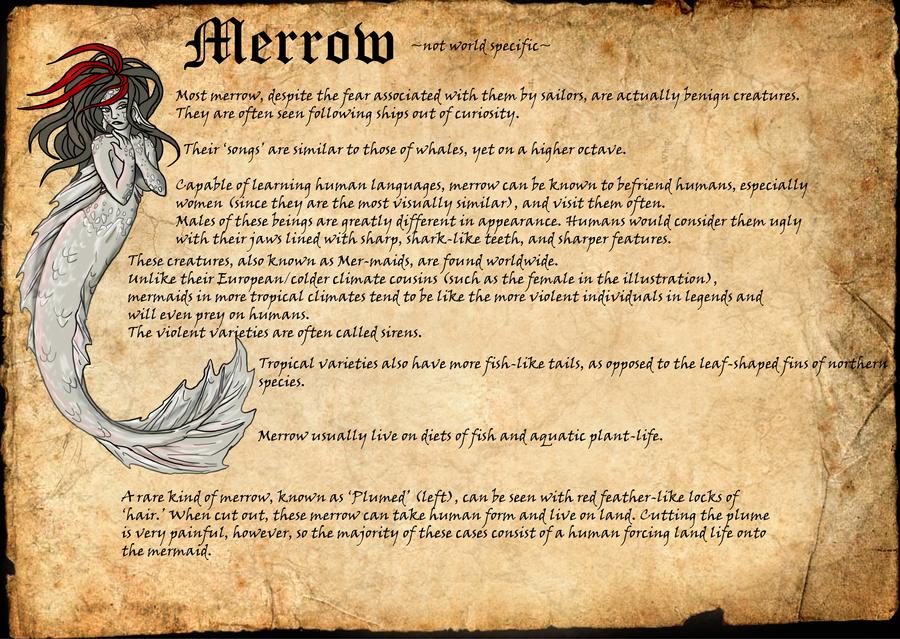
The Encyclopedia of Celtic Mythology and Folklore by Patricia Monaghan
Cohuleen druith Irish folkloric object. Irish mermaids wore this little cap, which allowed them to swim beneath the waters of lakes and sea without danger. Should her cap be lost or stolen, however, the mermaid henceforth was forced to remain landbound.
Mermaid (Merrow, Morrough, Moruach, Moruadh, Maighdean-mara, Ben-Varrey, Mary Morgan) Continental and insular folkloric figure. Half-human, half-fish beings are found in the folklore of all Celtic lands, from the west of Ireland across Scotland and England to the coasts of France. These figures most often appeared as female, although male merfolk are occasionally known.
A mermaid was a kind of sea fairy, and Otherworld creature who swam in shallow coastal waters, often with the intention of drawing humans into the brine and to their deaths. Their sweet singing lulled people to sleep wherever water could lap over them so they drowned; these figures may be confused with the classical siren, a death-messenger who appears as a bird as well as a singing maiden.
In England mermaids were associated with freshwater as well as the ocean; the Lake Maidens did not live in running water but only in pools and other still water. The first syllable in their name, which appears to mean “sea” (from the French, mer), in fact comes from the Anglo-Saxon meer for “lake” or “inland sea”.
In Ireland the moruadh or moruach (“seamaid”) was known from the earliest literature, for in the Book of Invasions, mermaids played in the waves as the invading Milesians approached the shore.
*More can be read in the book.

Further Reading:
Folklore of Merrows in a Nutshell by Ronel
Merrow women have been described as being extremely beautiful – and promiscuous with mortals. Merrow men have been described as being exceptionally ugly and scaly, with pig-like features, green hair and long, pointed teeth. The only way to differentiate between merrows and humans is that they have thin webbing between their fingers and their feet are flatter.
Merrows are regarded in some parts of Ireland as messengers of doom and death.
Merrows are thought to wear special clothing that enables them to swim through ocean currents and a small red cap, sometimes bedecked with feathers. In chilly northerly waters, they wear sealskin cloaks and they take on the appearance and attributes of seals.
If a mortal were to confiscate and hide a merrow’s cap/cloak, the merrow would be land-bound. Fishermen do this to have a wealthy merrow bride (they have loads of treasure from shipwrecks). But, just like the selkie bride, if the merrow retrieves her hidden cloak/cap, she will return to the sea, leaving her human husband and children behind.

Merrows in Modern Culture
I found two novels on Goodreads featuring Merrows! They both sound like fun reads.
Waking the Merrow (The Merrow Trilogy #1) by Heather Rigney
In 1772, angry Rhode Island colonists set fire to a British ship, sparking the American Revolution. Taxation without representation was a motivator. So was the vengeful, man-eating mermaid who had it out for the commanding officer. That was then. This is now. Mermaids, or merrow, still hunt in Narragansett Bay, but these days they keep a lower profile. At night, centuries-old Nomia seduces smutty frat boys, lures them into icy waters, and feeds them to her voracious kin. By day, she and her half-breed daughter attempt to blend in at the coastal Village Playground. But Nomia slips up. She makes a friend. Then she makes that friend disappear, and someone notices. Thirty-something Evie McFagan just wants to make it through working motherhood. But she’s a blistering stew of issues—snarky alcoholic and a friendless funeral director who just witnessed Nomia dismembering a guy at the nearby yacht club. When Evie believes a mermaid stole her baby, who will help? The merrow of Ireland? Or maybe anti-hero Evie will surprise everyone, including herself, and summon the strength to save her own family. Intertwining the stories of two primordial families with the colonial history of Narragansett Bay, Waking the Merrow is a dark historical fantasy.
Merrow (Secrets of Carrick) by Ananda Braxton-Smith
In this breathless and beautifully crafted tale, twelve-year-old Neen Marrey must separate town gossip from town lore to learn the truth about her mother – and herself.
The people of Carrick Island have been whispering behind Neen’s back ever since her father drowned and her mother disappeared. The townspeople say her mother was a merrow and has returned to the ocean. Neen, caught in her hazy new in-between self – not a child, but not quite grown up – can’t help but wonder if the villagers are right. But if her mother was a merrow, then what does that make Neen?

Merrows in My Writing
Origin of the Fae: Merrows
Merrows keep the souls of the drowned in cages until they can be collected by Black Dogs (usually Grims or Barguests) to go to their final resting place in the Underworld.
They live in the in-between world Tir fo Thoinn (the Land beneath the Waves) just like most other Fae who fall within the Water Fae Classification (e.g. Selkies, Sirens, Jengu, etc.).
Just like all Fae, they are able to change their appearance at will. When not in their mermaid-like form, fish tails and all, they wear warmer coats resembling sealskin to survive icy waters. The webbing between their fingers and toes makes it easier to swim.
All their magic is kept in their red caps without which they do not dare go near other Merrows for fear of enslavement. Better to wait out the human who stole it and pretend to be captured than face true torment at the hands of their own for eternity.
Merrows, like all Fae, enjoy toying with humans. And though they’ll warn against storms, chances are they were the ones who created it.
Some even hunt humans to eat them and keep their souls in cages as pets.
Merrow translated to Afrikaans: Meervrou/Meerman
See them in action:
Once… Tales, Myths and Legends of Faerie

She sighed longingly and sat down on the side of the fountain.
‘I thought you said you were going to win the prince’s heart and live happily in the warm chateau?’ asked the merrow who lived in the fountain. She took off her red cap and wrung it out before putting it on again.
‘None of the dresses in the big closet look right on me.’
‘Of course not! It was made for Vivian and her daughters. You aren’t like them.’
Carina looked away from the merrow. She didn’t need the reminder that she was different.
The Ashiest Princess, Once… Tales, Myths and Legends of Faerie, Ronel Janse van Vuuren
What do you think of Merrows? Are they alive and well in your corner of the world? Any stories about Merrows you’d like to share? You can check out more fun folklore facts about Merrows on my Pinterest board dedicated to them.
You can listen to this post on my podcast:
You can now support my time in producing folklore posts (researching, writing and everything else involved) by buying me a coffee. This can be a once-off thing, or you can buy me coffee again in the future at your discretion.
Want a taste of my writing? Sign up to my newsletter and get your free copy of Unseen, Faery Tales #2.


No-one writes about the fae like Ronel Janse van Vuuren.


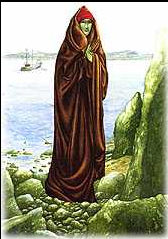

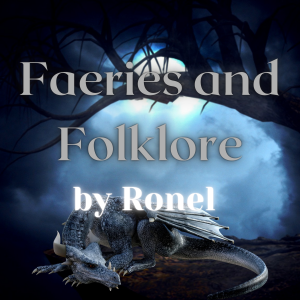

I have always been fascinated by the image of the soul cages…
The Multicolored Diary
That makes two of us 🙂
The story is very much like the stories of selkies and their sealskins.
Frankly, I’m not surprised the marrow men don’t have anyone wanting to steal their caps! Maybe the merrow women find them sexy, though.
I agree. Many of these “mermaid” stories seem to have various commonalities.
A great choice for M. Entrapping women in to marriage is new right, no matter what the species, and it never ends well – when will mortal men realise this?
My M today over at Virginia’s blog is a mermaid too 😂
Tasha 💖
Virginia’s Parlour – The Manor (Adult concepts – nothing explicit in posts)
Tasha’s Thinkings – Vampire Drabbles
Thanks! Entrapping others in marriage seems to be something humans think is a good idea — until murder and mayhem ensues!
Feel sorry for Dick Fitzgerald but I guess he got paid back.
Mom and Memory
He made his bed…
I recently read Shearwater by D.S. Murphy, a fantasy romance set in modern-day Ireland that is built on legends of the merrow. The book was okay but it mostly made me curious to learn more about traditional stories of the merfolk.
Since I’m a New Englander, I’m also going to look into reading Waking the Merrow.
I’m glad my post helped with the curiosity. I hope you enjoy the book 🙂
Lovely mermaids!
M is for Modern Quilts
I enjoy the various folklore involving mermaids — I’m going to write a lot of posts, judging by the research I’ve done!
You sure did a lot of research. If the rest of the posts are like this, then a2z must have taken months to set up this year. Enjoy the hop. 🙂
Anna from elements of emaginette
Thanks, Anna 🙂 My entire A-Z looks like this!
I like the first story, but I wish she would have come back to visit from time to time.
I like the first story, but I wish she would have come back to visit her husband and children from time to time.
Something must have happened to stop her from doing so…